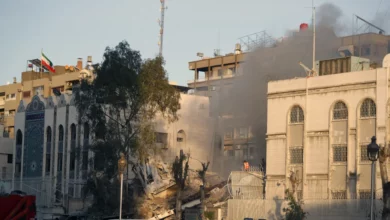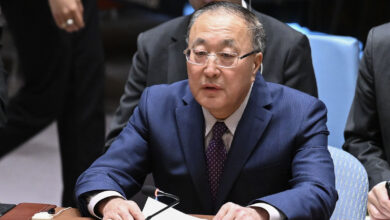Amman — Syrian security forces fired at pro-democracy protests which broke out across the country on Friday, witnesses said, as demonstrators demanded an end to President Bashar al-Assad's 11-year rule.
Tens of thousands of Syrians took the streets at the start of a sixth week of protests and chanted for the "overthrow of the regime," reflecting the steady hardening of demands which initially focused on reforms and greater freedoms.
"God, Freedom and Syria only. God is greatest," was another rallying cry that echoed after Friday prayers.
Protests swept the country of 20 million people, from the Mediterranean city of Banias to the eastern towns of Deir al-Zor and Qamishli. In Damascus security forces fired teargas to disperse 2000 protesters in the district of Midan.
More than 220 protesters have been killed since unrest broke out on 18 March in southern Syria, rights groups say, including 21 protesters killed this week in the central city of Homs.
Human rights lawyer Razan Zaytouna told Al-Arabiya television she had names of six people killed on Friday, including two in the central city of Homs and two others in the southern town of Izra'a.
It was not immediately possible to confirm the number of deaths, but one witness told Reuters that at least two people had been killed in the Damascus district of Barzeh. Activists said they had heard reports of numerous other deaths in unrest in rural areas and suburbs around the capital.
Assad signed a decree on Thursday lifting emergency law, imposed by his Baath Party when it took power in a coup 48 years ago, but other laws still give security forces wide powers and opposition figures have stepped up demands for concessions.
As in the Tunisian and Egyptian revolutions that ousted Hosni Mubarak and Zine al-Abidine Ben Ali citizens are rebelling not just against a lack of freedom and opportunity but against security forces impunity and corruption that has enriched the elites while one-third of Syrians live below the poverty line.
In the first joint statement since the protests broke out, activists coordinating the mass demonstrations demanded on Friday the abolition of Baath Party monopoly on power and the establishment of a democratic political system.
"All prisoners of conscience must be freed. The existing security apparatus has to be dismantled and replaced by one with specific jurisdiction and which operates according to law," they said in the statement, which was sent to Reuters.
Aided by his family and a pervasive security apparatus, Assad, 45, has absolute power in Syria.
FORCES "FIRE AT PROTESTERS"
In the city of Hama, where Assad's father ruthlessly crushed an armed Islamist uprising nearly 30 years ago, a witness said security forces opened fire to prevent protesters reaching the headquarters of the ruling Baath Party.
"We saw two snipers on the building. None of us had weapons. There are casualties, possibly two dead," said the witness.
Witnesses said security forces also shot at demonstrators in the Damascus district of Barzeh, the central city of Homs, the Damascus suburb of Douma, and on protesters heading for the city of Deraa, where Syria's uprising first broke out five weeks ago.
Ahead of the main weekly prayers on Friday, which have often proved the launching pads for major demonstrations, the army deployed in Homs and police put up checkpoints across Damascus, apparently trying to prevent protests sweeping in from suburbs.
After prayers finished in Deraa, several thousand protesters gathered chanting anti-Assad slogans. "The Syrian people will not be subjugated. Go away doctor (Assad). We will trample on you and your slaughterous regime," they shouted.
Joshua Landis, a Syria expert at Oklahoma University, said the Syrian government had "drawn a line in the sand" after offering concessions, and that Assad made clear he believed "there is no longer reason to demonstrate."
"The organizers of the revolution vowed to turn out their largest numbers yet…They are determined to bring down the regime and understand that this is their chance," he said.
"Friday will be a day of reckoning."
Joe Stork of Human Right Watch said Assad's "reforms will only be meaningful if Syria's security services stop shooting, detaining, and torturing protesters."
Assad's conciliatory move to lift the state of emergency followed a familiar pattern since the unrest began a month ago: pledges of reform are made before Friday when demonstrations are the strongest, and are usually followed by an intense crackdown.
The authorities have blamed armed groups, infiltrators and Sunni Muslim militant organisations for provoking violence at demonstrations by firing on civilians and security forces.
Western and other Arab countries have mostly muted their criticism of the killings in Syria for fear of destabilizing the country, which plays a strategic role in many of the conflicts in the Middle East.
Syria is technically at war with Israel but has kept its Golan Heights front with the Jewish state quiet since a 1974 ceasefire. It has long borders with Iraq, and supports the Palestinian Islamist group Hamas and the Shia Hizbullah movement in neighboring Lebanon, also backed by Iran.




